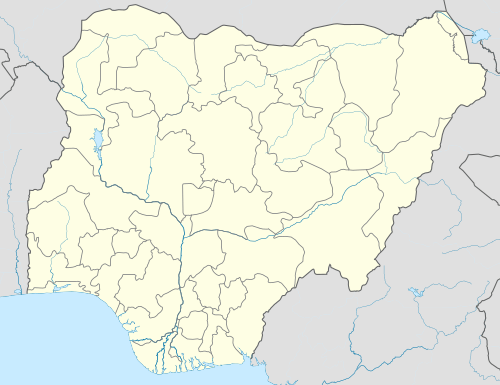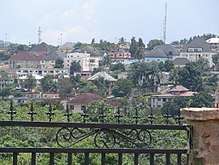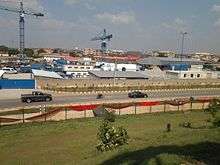Onitsha
Onitsha (Igbo: Ọ̀nị̀chà Mmílí[3] or just Ọ̀nị̀chà) is a city located on the eastern bank of the Niger River, in Nigeria's Anambra State. A metropolitan city, Onitsha is known for its river port and as an economic hub for commerce, industry, and education. It hosts the Onitsha Main Market, the largest market in Africa in terms of geographical size and volume of goods.
Onitsha Ọ̀nị̀chà Mmílí Port City | |
|---|---|
Metropolis | |
 Onitsha Skyline | |
 Seal | |
| Nickname(s): Port City, Onitsha(Osha) | |
| Motto(s): Economic Hub For Commerce, Industry, And Education | |
| Anthem: "With all our hearts, We Pray and ask" | |
 Onitsha Onitsha in Nigeria | |
| Coordinates: 6°10′N 6°47′E | |
| Country | |
| State | Anambra State |
| LGA | Onitsha North, Onitsha South |
| Founded | 1550 |
| Settled | 15th Century |
| Incorporated City | 19th Century |
| Government | |
| • Type | Constitutional_Monarchy, Executive Chairman Local Government Council |
| • Constitutional Monarchy | Obi of Onitsha Igwe Nnaemeka Alfred Achebe, "Agbogidi" |
| • Executive Chairman | Mr Patrick Agha-Mba Onitsha North
|
| • Anambra North Senatorial District, Onitsha | Stella_Oduah-Ogiemwonyi |
| Area | |
| • Metropolis | 52 km2 (20 sq mi) |
| • Land | 36.12 km2 (13.95 sq mi) |
| • Water | 0.067 km2 (0.026 sq mi) |
| • Urban | 1,965 km2 (759 sq mi) |
| • Metro | 1,965 km2 (759 sq mi) |
| Population (2006 census) | |
| • Metropolis | 261,604 |
| • Density | 5,030.8/km2 (13,030/sq mi) |
| • Urban | 7,425,000 |
| • Ethnicity | Igbo >90%, Others |
| • Demonym | Onye Onicha (singular) Ndi Onicha (plural) (Igbo) |
| Time zone | UTC+1 (WAT) |
| Postcode | 430...[2] |
| Area code(s) | 046 |
| Climate | Aw |
| Website | https://anambrastate.gov.ng |
In the 2006 Nigerian census, Onitsha had an estimated city proper population of over quarter a million people, and, as of 2016, had an estimated urban population of 7,425,000.[4] The indigenous people of Onitsha are Igbo and speak the Igbo language. The Onitsha people are referred to as Ndi Onicha.
Founding and settlement

Onitsha Mmili was originally known as Onitsha Ado na Idu. These Igbo migrants traveled eastward from Western Igboland andeventually emigrated across the Niger River to establish the Onitsha community.
After their arrival on the east bank (Onicha-mmili, "Onitsha-on-water", see above), the community gradually became a unitary kingdom, evolving from a loosely organized group of "royal" villages to encompass "non-royal" villages.
Modern history

Onitsha slowly grew to become an important trading port for the Royal Niger Company in the mid-1850s following the abolition of slavery and with the development of the steam engine when Europeans were able to move into the hinterland.
Trade in palm kernels, palm oil, and other cash crops on the coast of the Bight of Biafra increased around this river port in the 19th century.
In 1857 British palm oil traders established a permanent station in the city with Christian missionaries joining them, headed by the liberated African bishop Samuel Ajayi Crowther (a Yoruba recaptive) and Reverend John Taylor (an Igbo Recaptive).[5]
In 1900 Onitsha became part of a British protectorate.[6] The British colonial government and Christian missionaries penetrated most of Igboland to set up their administration, schools and churches through the river port at Onitsha.
In 1965, the Niger River Bridge was built across the Niger River to replace the ferry crossing. This has helped to grow trade routes with western Nigeria and created significant economic linkages between Onitsha and Benin City and Lagos particularly.[7][8]
The Nigerian-Biafran war brought devastation to Onitsha as the city was a major theatre of war for forces entering Biafra from the western front. The subsequent oil boom years of the 1970s and early 1980s witnessed a huge influx of immigrants into the city. The result has been hastily constructed and haphazard building which has created a huge number of slums.[9]
People and culture

Onitsha traditionally consists of nine villages, otherwise known as Ebo Itenani. These are descendants of the progenitor Umuezechima comprising Isiokwe, Olosi, Umuezearoli, Okebunabo, Obikporo and Ogbeotu which claim origin from Igala in Kogi state, Awada (Ogbeozoma), Obamkpa comprising Umuasele, Iyiawu and Odoje Ndugbe and Odumegwu Gbuagu, Ubulu na Ikem, Ulutu, Ubene, Ogboli Eke, Obior and Ogbeotu. Within these groupings, there are six administrative wards namely Okebunabo, Umuezearoli, Ogbeolu, Isiokwe na Ogboli Olosi, Obamkpa and Eke na Ubene.
| Umuaroli | Ogbendida | Ogbeozoma | Isiokwe |
| Ogboli-Eke | Ogboli-Olosi | Umudei | Ogbembubu/Ogbeabu |
| Ogbeodogwu | Obikporo | Ogbeotu | Umuasele |
| Odoje | Umuikem | Mgbelekeke | Iyiawu |
| Obior |
Onitsha operates a traditional government headed by the Obi, the titular head of the town who is assisted by Ndi Ichie, titled red cap elders or chiefs. Among these are Ndi Ichie Ume, who are the First Class Chiefs. The Ndi Ichie are classified into six, namely: Onowu Iyasele, Ajie Ukadiugwu, Odu Osodi, Onya Ozoma, Ogene Onira and Owelle Osowa, with Onowu Iyasele as the traditional Prime Minister. There are also other Ndi Ichie, who are ranked second class, known as Ndi Okwa and third class, known as Ndi Ichie Okwareze. The Ndi Ichie serve as Council of Advisers to the Obi who solicits their advice in major decisions he makes in the Kingdom.[10]
When the ruling Obi joins his ancestors, the Onowu Iyasele takes charge until a new Obi is enthroned.
Once a year in October the kingdom of Onitsha holds the Ofala Festival which coincides with the traditional New Yam festival held in many parts of Igboland. It is a way for the people of Onitsha to keep their culture alive and it has become a major event that draws visitors from far and wide to the city.
Geography
Onitsha lies at a major east–west crossing point of the Niger River and occupies the northernmost point of the river regularly navigable by large vessels. These factors have historically made Onitsha a major center for trade between the coastal regions and the north, as well as between eastern and western Nigeria. Onitsha possesses one of the very few road bridge crossings of the mile-wide Niger River[11][12] and plans are in place to add a second bridge near it.
Rapid urbanization in recent years negatively affects natural vegetation and local landscape.[13]
Urbanization
In the early 1960s, before the Nigerian Civil War (see also Biafra), the population was officially recorded as 76,000, and the town was distinctive in a number of dimensions;[14][15] the great Nigerian writer Chinua Achebe (born and raised in the contiguous town of Ogidi) characterized it as harboring an "esoteric region from which creativity sallies forth at will to manifest itself," "a zone of occult instability" (see "Onitsha Matters").



Indeed, Onitsha has played a creative role in the transformation to urban life in Eastern Nigeria famous as the setting for Onitsha Market Literature and as one of the hubs for the financing and distribution of Nollywood films.[16]
However, infrastructure has not kept pace with urbanization and haphazard building practices without zoning regulations has left in its wake a chaotic and congested city rife with lawlessness. The World Health Organization Global Urban Ambient Air Pollution database's 2016 update indicates that Onitsha is the most polluted city in the world.[17][18]
In recent times with its expansion into neighboring communities, the Onitsha people have been involved in disputes over land ownership in the surrounding area with the people of Obosi and Nkwelle ezunka.[19][20] Fegge, Woliwo, Odoakpu, Awada, and 3-3 are Onitsha metropolitan areas being disputed by the communities of Obosi and Nkwelle Ezunanka, respectively.

Economy

In 2012 the state government, through a joint venture, attracted SAB Miller to invest in Onitsha Brewery, which started production in August. It was the first large-scale investment in Onitsha since Premier Breweries, makers of the Premier Beer established production in Onitsha in the early part of the 1980s. In January it was announced that upgrades to the value of $110 million would triple the output of beer and malt drinks.[21]
Religion and politics
Onitsha is a predominantly Christian city. Islam is also practiced in the city by people from Northern and Western Nigeria. In February 2006, armed militants killed at least 24 ethnic Hausa Fulani (Muslims) and burned a few Muslim sites, including two mosques.[22][23][24] The riots were in response to riots by Muslims in the city of Maiduguri days earlier, where at least 18 Christians were killed, sparked by the cartoon controversy in Denmark.
Twin towns
Onitsha is twinned with:


Notable people
The Onitsha people were among the first Igbo to embrace western education,[27] producing notable people like Bishop Alphonsus Chukwuma Onyeabo, Order of the British Empire, 1879–1954, and the main contributor to English to Igbo bible. Dr. Nnamdi Azikiwe, Owele of Onicha, Zik of Africa, and the first president of the post-independent Nigeria.
- Ben Enwonwu, painter and sculptor
- Louis Mbanefo, lawyer and justice
- Chike Obi, mathematician
- Ukpabi Asika, politician
- Emmanuel Ifeajuna, a former army major and high jumper - first Black African to win gold at a major international sports competition
- Olisa Agbakoba, lawyer and human rights activist
- Henry Onyekuru, footballer
- Alex Iwobi, professional footballer, Everton forward
See also
- Onitsha Market Literature – literature sold at the main market in the 1950s and 60s
- Onitsha – a novel by French author J. M. G. Le Clézio
- Ryszard Kapuscinski writes of "The Hole of Onitsha" in his book The Shadow of the Sun.
References
- UN Habitat (2009). Structure Plan for Onitsha and Satellite Towns. UN-HABITAT. ISBN 978-92-1-132117-3. Archived from the original on 2011-09-27. Retrieved 2010-06-20.
- "Nipost Postcode Map". Nigerian Postal Service. Archived from the original on 2012-11-26. Retrieved 2010-05-08.
- Okanga, Eloka Chijioke Paul Nwolisa (2003). Njepu amaka--migration is rewarding: a sociocultural anthropological study of global economic migration. Peter Lang. p. 63. ISBN 0-8204-6090-7.
- Demographia (April 2016). "Demographia World Urban Areas" (PDF) (11th ed.). Retrieved 21 October 2016.
- Taylor, Crowther & (2010) [1859]. The Gospel on the Banks of the Niger: Journals and Notices of the Native Missionaries Accompanying the Niger Expedition of 1857–1859. Cambridge University Press. ISBN 978-1-108-01184-6..
- Anene, J. C. (1966). Southern Nigeria in Transition 1885–1906. Cambridge University Press. pp. 212–213.
- "With New Funding, Second Niger Bridge Offers Hope of Economic Revolution". The Business Year. Retrieved 2020-02-07.
- "Onitsha | Hometown.ng™". Retrieved 2020-01-22.
- "About Onitsha". onitshacitymarathon.com. Retrieved 2020-01-22.
- "Bienvenue | owlapps". next.owlapps.net. Retrieved 2020-05-27.
- "The second Niger Bridge". The Daily Sun. 2007-02-20. Retrieved 2007-04-06.
- "Britannica". Retrieved 2008-10-02.
- Nwaogu, Chukwudi; Okeke, Onyedikachi J.; Fadipe, Olusola O.; Bashiru, Kehinde A.; Pechanec, Vilém (2017). "Is Nigeria losing its natural vegetation and landscape? Assessing the land use-landcover change trajectories and effects in Onitsha using remote sensing and GIS". Open Geosciences. 9 (1): 707–718. Bibcode:2017OGeo....9...53N. doi:10.1515/geo-2017-0053.
- "Onitsha | owlapps". next.owlapps.net. Retrieved 2020-05-27.
- Ekejindu, I.M. "Common Respiratory Fungal Pathogens in Municipal Solid Waste Workers in Anambra State, Nigeria" (PDF). International Journal of Current Microbiology and Applied Sciences. 6 (10 (2017)): 421–436.
- Madichie, Nnamdi; Nkamnebe, Anayo (2010-11-01). "51 Iweka Road (Onitsha, Nigeria): Could this single African address redefine business cluster development?". World Review of Entrepreneurship, Management and Sustainable Development. 6 (3): 229–243. doi:10.1504/WREMSD.2010.036677.
- "A New Air Pollution Database Is Good, but Imperfect | Data-Driven Yale". datadriven.yale.edu. Retrieved 2016-11-25.
- Cunningham, Anna (October 22, 2018). "Amid Staggering Pollution, Nigerians Struggle to Catch Their Breath". Undark. Retrieved 2019-09-27.
- Vincent Ujumadu (June 17, 2013). "17 injured, bus burnt as Onitsha, Obosi youths clash over land". Vanguard. Retrieved September 2, 2014.
- Nigeria: "Nkwelle-Ezunaka Battles Onitsha Over Land". Nkwelle Ezunaka Union USA. Retrieved September 2, 2014.
- "SAB Miller investing $110 m to triple Onitsha brewery capacity". Retrieved 28 February 2014.
- "Scores killed in Nigeria riots". Al Jazeera. 2006-02-23. Cite journal requires
|journal=(help) - "Toll rises in Nigeria sectarian riots". Al Jazeera. 2006-02-24. Cite journal requires
|journal=(help) - Timberg, Craig (2006-02-24). "Nigerian Christians Burn Corpses". The Washington Post. pp. A10. Retrieved 2007-04-06.
- "Sister Cities of Compton". comptonsistercities.org. Archived from the original on 2016-01-23. Retrieved 2013-07-02.
- Mejia Lutz, Elena (June 26, 2017). "Indy partners with Nigerian city for business, cultural exchange". The Indianapolis Star. Retrieved June 26, 2017.
- Ubah, C. N (1980). "Western Education in Africa : The Igbo Experience, 1900-1960". Comparative Education Review. 24 (3): 371–388. JSTOR 1187793.
Further reading
- Richard N. Henderson (June 2004). The King in Every Man: Evolutionary Trends in Onitsha Ibo Society and Culture. Richard Henderson. ISBN 978-0-9740440-0-2.
External links
- "Onitsha Matters", a website presenting many facets of Onitsha's history in its geographic and cultural context, including many topics and numerous photographic images.
